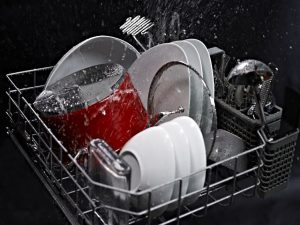How Much Dishwasher Detergent Should You Use?

These days a dishwasher is considered an essential home appliance. Most homes are equipped with a dishwasher, but this doesn’t mean that everyone is enjoying sparkling clean dishes. Although there are a lot of factors that can affect dishwasher’s performance, one of the most important is the detergent. Using too little detergent will leave your dishes dirty, but too much can also create problems. So here we’ll delve a little deeper into how much detergent you should be using to get those sparkling clean results.
How Old is Your Appliance?
The first consideration for determining the correct amount of dishwasher detergent is the age of your appliance. If you’ve recently upgraded from an old machine, you’re likely to have experienced some issues if you’ve not adjusted your detergent levels. Modern dishwashers are designed to be as energy and water efficient as possible, so they use far less water than older models. This reduced water use means that you also need far less soap to complete the task.
In the late 1970s when dishwashers had started to become very popular, the average model used approximately 15 gallons of water per cycle. This decreased to between six and 10 gallons per average cycle in the 2000s, but has dropped again with today’s dishwashers that can use as little as 2 gallons. This makes it easy to see how using the same amount of detergent that you’ve gotten used to using in your 1980s model is sure to create a problem in a brand new appliance.
So, What’s the Right Amount?
According to luxury home appliance brand, KitchenAid, most dishwasher models require between 2 teaspoons and 3 tablespoons of detergent. This depends greatly on the soil level of your dishes, your water hardness level and the type of detergent you are using. Most manufacturers provide guidelines in the appliance owner’s manual. This is typically a table that lists the amount of detergent needed for various water hardness levels and load soil requirements.
Avoid Pre Washing
It is also important to note that regardless of how much detergent you use, if you are in the habit of pre-washing all your dishes, you may struggle to get them clean. This may seem counter-intuitive, but dishwasher detergents need grime to activate. While your dishwasher may be equipped with a pre-wash cycle, most loads do not require this. Pre Washing will not only use more water and energy, but it can remove the grime needed for the detergent to be chemically activated. In most cases, pre-washing is only necessary if you will have a part load sit for a prolonged period before the full load is washed.
Any modern dishwashers are equipped with sensor technology. These turbidity sensors monitor the water and soil level, adjusting the water volume and temperature accordingly, eliminating the need for pre-washing. Instead of automatically choosing a pre-wash cycle, scrape all your dishes to use less soap and achieve that sparkling clean finish.
Choose the Right Program
Finally, you need to choose the right program and tailor your detergent accordingly. While you may need to tackle a tough load with a Pots & Pans cycle, most dishes will not require these intensive temperatures and wash conditions. Remember that if you’re using a lower temperature, faster wash, you’ll need far less detergent compared to an intense wash. So, be sure to choose the right program for your load and tailor the detergent level accordingly.
If you’re still struggling with your dishwasher performance and you’re considering an upgrade, you can explore your options with this online dishwasher collection. Additionally, you can speak to a home appliance expert for further help or a more specialized service.
- Do You Really Need a Second Oven? When a Double Oven Makes Sense
- How to Choose the Right Faucet Finish for Your Kitchen or Bathroom
- Designing the Ultimate Outdoor Kitchen: Hestan, Lynx, and DCS Essentials for 2025
- Should You Feature Graff, Dornbracht, or Axor? 2025 Faucet & Sink Trends in Luxury Design
- Dishwasher Buying Guide 2025: Quiet, Clean, and Panel-Ready Options Explained
- Luxury Range Buying Guide 2025: How to Choose the Perfect Pro-Style Range
- How to Match Appliances with Your Kitchen Cabinet Style
- Luxury Kitchen Appliance Packages: Are They Worth It For Beverly Hills Homeowners?
- Built-In vs. Freestanding Refrigerators: Which Is Better for a Luxury Kitchen?
- Top 5 Luxury Kitchen Appliance Packages for Upscale LA Remodels





